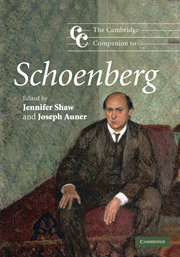Book contents
- Frontmatter
- 1 Introduction
- Part I Schoenberg's early years
- Part II Schoenberg, modernism, and modernity
- Part III Schoenberg between the World Wars
- 10 Schoenberg as teacher
- 11 Schoenberg, satire, and the Zeitoper
- 12 Schoenberg's row tables: temporality and the idea
- 13 Immanence and transcendence in Moses und Aron
- 14 Schoenberg, the Viennese-Jewish experience and its aftermath
- Part IV Schoenberg's American years
- Notes
- Select bibliography
- Index
13 - Immanence and transcendence in Moses und Aron
from Part III - Schoenberg between the World Wars
Published online by Cambridge University Press: 28 September 2011
- Frontmatter
- 1 Introduction
- Part I Schoenberg's early years
- Part II Schoenberg, modernism, and modernity
- Part III Schoenberg between the World Wars
- 10 Schoenberg as teacher
- 11 Schoenberg, satire, and the Zeitoper
- 12 Schoenberg's row tables: temporality and the idea
- 13 Immanence and transcendence in Moses und Aron
- 14 Schoenberg, the Viennese-Jewish experience and its aftermath
- Part IV Schoenberg's American years
- Notes
- Select bibliography
- Index
Summary
Schoenberg's opera Moses und Aron dramatizes – along philosophical, theological, and psychological lines – the predicament of the prophet, who grasps the essential unrepresentability (Unvorstellbarkeit) of the Divine, but cannot communicate an understanding that supersedes language and concepts. Although Schoenberg may resemble his protagonist Moses in some respects, the opera cannot be reduced to an allegory on the modern artist's intractable position. Rather, it examines the human condition from multiple perspectives, by exploring the distinct spiritual and psychological experiences of Moses, Aron, and the Jewish Volk, through their diverse capacities for awareness, insight, expression, and belief. The opera is fundamentally concerned with the limits of perception and knowledge, and with the potential for human spirit and intellect (Geist) to supersede those limits. The music's fabric of sound, more than the events portrayed or the ideas articulated by the words, conveys the experience and import of those epistemological limits.
In his book Metaphysical Song, Gary Tomlinson elucidates how opera has always echoed contemporaneous systems of epistemology and metaphysics, using the sonorous presence of the human voice to point toward the supersensible realm – as each philosophical (and operatic) age conceived it. The philosophical ground for modern opera is given by Kantian epistemology, in which human intuition and thought are fundamentally limited to immanent and sensible phenomena, and cannot access the transcendental realm of noumena.
- Type
- Chapter
- Information
- The Cambridge Companion to Schoenberg , pp. 177 - 190Publisher: Cambridge University PressPrint publication year: 2010
- 1
- Cited by



